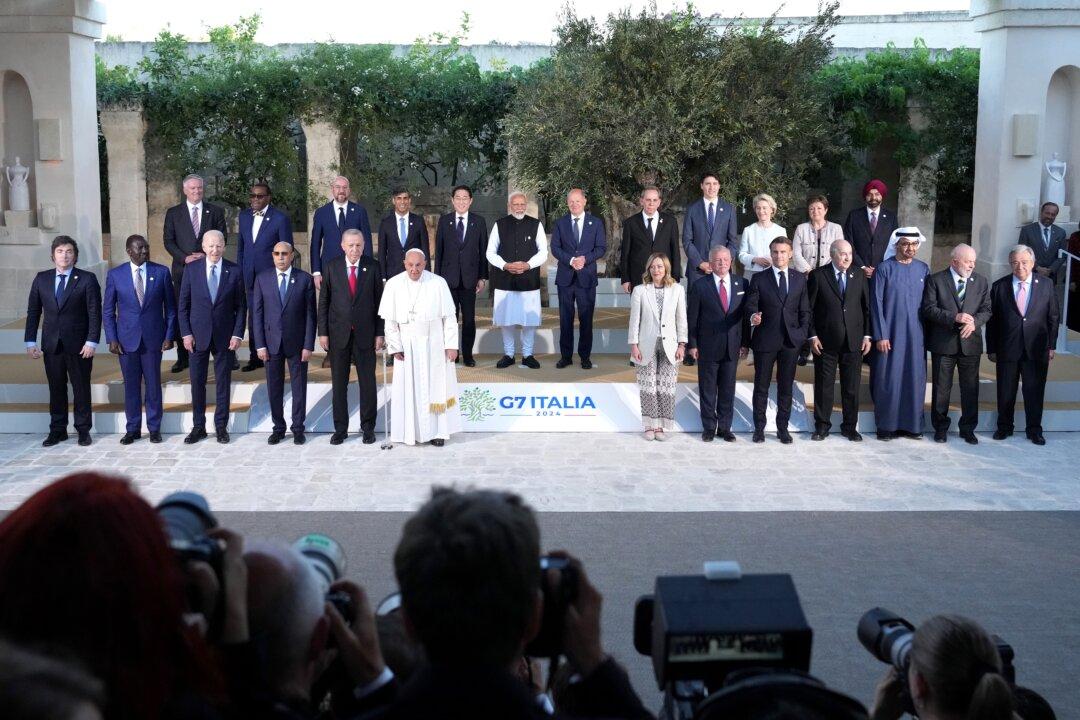Commentary
Leaders from the group of the world’s wealthiest and, therefore, most powerful democracies met in Italy from June 13 to 15 at a picturesque Apulia resort on the Adriatic Sea. It was the 50th anniversary of the Group of Seven (G7) nations. But not all was sun, sand, and smiles.
The G7 leaders focused attention on threats from Russia and China. They showed greater alarm than ever about communist China’s direction, including its threats against U.S. infrastructure and support for Russia’s war in Ukraine. U.S. President Joe Biden and other leaders were most concerned about the Beijing–Moscow nexus at the center of a growing global instability.
The G7 implied that if Beijing continues to export weapons components to Russia, it would get hit with more sanctions, including against Chinese institutions that finance the illicit trade. In a joint statement issued at the end of the summit, the G7 leaders noted, “We will continue taking measures against actors in China and third countries that materially support Russia’s war machine, including financial institutions, consistent with our legal systems, and other entities in China that facilitate Russia’s acquisition of items for its defense industrial base.”
Until now, most “measures” against China for its support of Russia have been sanctions by the United States against Chinese nationals and companies that materially support Russia’s war. European countries have generally not yielded to U.S. pressure to join these sanctions, so the new G7 language is an important development despite its vagueness.
According to a confidential source cited by The New York Times, the language on “taking measures” was pushed by the United States. If the other G7 leaders put their money where their mouth is, new secondary sanctions on China could emerge from Japan, Canada, or Europe in the coming months.
In the past, the G7 pandered to the Chinese Communist Party (CCP) to try to get its support on issues such as climate, the COVID-19 pandemic, and now Russia. Beijing reportedly discouraged Russian President Vladimir Putin from executing his nuclear threats against Ukraine. Now, however, U.S. and Ukrainian officials claim that Beijing has also discouraged other countries from attending Ukraine’s peace conference, which opened in Switzerland on June 15.
At some point, the CCP could use its leverage to force Moscow into an agreement with Ukraine. That agreement would likely be a win for Russia to serve as a precedent for Beijing if it invades Taiwan. Any Beijing-brokered agreement would acquiesce to Moscow’s major demands: acceptance of Russia’s de facto territorial gains in Crimea and the Donbass and a promise by Kyiv not to join NATO.
The G7 leaders also pushed Beijing to reorient the Chinese economy toward serving Chinese citizens rather than on exports. The statement addressed Taiwan, the South China Sea, and human rights abuses in Xinjiang, Tibet, and Hong Kong. However, it did not mention the abuse of Chinese democracy advocates on the mainland or the persecution of Falun Gong practitioners.
The G7 listed its own values in the statement as “democratic principles and free societies, universal human rights, social progress, ... multilateralism and the rule of law ... providing opportunities and pursuing shared prosperity ... [and] international rules and norms.” It took issue with international “non-market policies” such as Chinese subsidies of its exports.
However, the statement failed to take a stand against communism and in favor of domestic free markets. Gone are the days of full-throated support for “market democracy.” The new mantra is just “democracy,” which China wrongly claims to adhere to, and “global trade,” which benefits China and the world’s biggest corporations. Significant support for small businesses and jobs being destroyed by global trade are not emphasized.
China’s state media is nevertheless highly critical of the G7, which it claims is under the influence of the United States, and focused on the wrong issues, given environmental crises and the ongoing war in Gaza. While the CCP would like to again bog the United States and our allies down in the Middle East and profit from exporting electric vehicles to supply the “green transition,” the G7 has turned from prioritizing environmental measures to prioritizing international stability. Meanwhile, factories in China are causing extensive pollution as they produce environmental products for the West.
The CCP threat and its hypocrisies are finally dawning on G7 leaders, who are starting to consider coordinated sanctions against the Chinese regime more seriously. Given that the United States, Europe, and Japan are the world’s biggest developed economies, the pressure on Beijing and the Chinese people will be significant in the coming years.
Unfortunately, the CCP has shown no indication of backing down from its malign policies—quite the opposite—so stay tuned for more fireworks.





